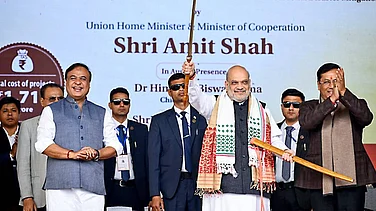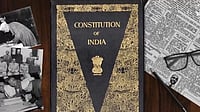Nationalist Congress Party (NCP) President Sharad Pawar announced that he is stepping down as the party president on Tuesday at the launch of his autobiography.
The announcement by Pawar, one of the grand old men of Indian politics, led to emotional scenes among his followers in the party leadership and among party workers. It also led to questions over the party’s future as there appears to be a rift in the party with Pawar’s nephew Ajit Pawar drifting towards Bharatiya Janata Party (BJP).
Within hours, Ajit announced that Pawar had agreed to rethink his decision to step down as the party chief and would take two to three days to make a decision.
Here we trace the timeline of the developments that led to Pawar’s announcement on Tuesday.
What did Sharad Pawar say?
Sharad Pawar announced he is stepping down as NCP President during the launch of his autobiography.
Pawar also announced the formation of a panel of senior party leaders that would plan the way forward for the party, reassuring the public that he was leaving the ship in good hands.
Pawar asserted that the time had come for him to step back from. In his words, he had had “a long period of public life from May 7, 1960 to May 1, 2023” and it was now time to step away from it. Pawar is 82.
Pawar’s surprise announcement sent shockwaves. Top NCP leader Praful Patel confirmed this, saying that Pawar did not take anyone into confidence before announcing his move.
Yet amidst all the speculation, hue and cry and inevitable outpouring of public sentiment, Pawar quietly outlined why indeed he was stepping back in his speech.
The road to Sharad Pawar’s announcement
Sharad Pawar’s nephew Ajit Pawar, who was by his side at the time of the announcement, summed it up succinctly, saying, “Pawar Saheb himself had said about the necessity of change of guard a few days back. We should see this decision in the light of his age and health.”
The elder Pawar elaborated on this further in his speech, doubling down on the point that he was resigning because the time had become right for him to take a step back, and allow for the party to move on.
In doing so, Pawar seemed to be following a worldwide recent trend of political leaders finally reflecting on whether they felt they could viably contribute to public life and party work anymore and then actively choosing to retire. Of this, New Zealand's Jacinda Ardern is the first and most prominent example, when she chose to take a step back, despite having the popular mandate.
In this sense, Pawar’s case is similar to Ardern’s — despite the obvious difference of age between the two. While speculation will continue about political rationales behind his decision, Pawar delivered an emotional speech along the same lines that Ardern did where he outlined his life in the public.
Pawar talked about how he started out as a youth leader. Starting with his days as a youth leader, he became a member of the Pune City Youth Congress on the same day the state of Maharashtra was formed. Then Pawar briefly outlined his six decades in public life — from his rise through the ranks to becoming one of the senior-most politicians of the country.
Pawar underlined how he felt the time had come to call the curtain, and that he had reached a point where he needed to take a step back because he could not contribute to the activities that a life in politics demanded with the same vigor that he once had.
Pawar was grateful for the support that the people had given him over his six decades of public life and hinted that this was part of why he had decided to arrive at his decision, putting it across that he had to do so, for it was in the best interest of the people he had served to have a change of guard which could contribute and take forward whatever he had built.
Pawar finished with his announcement of the senior leaders’ panel, clear messaging that he was stepping back so that the work could continue, and asserted that while he was stepping down, he was not leaving public life altogether.
Whether Sharad Pawar’s resignation sets a clear path of succession or leads to splintering and infighting amongst the different factions is yet to be seen. Whichever way the party goes, it’s likely that the trajectory will have an impact on the general elections next year.


























